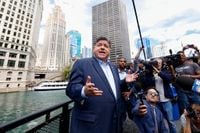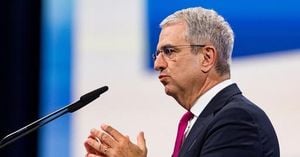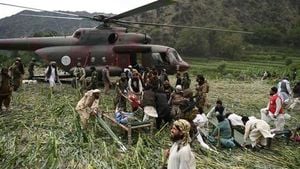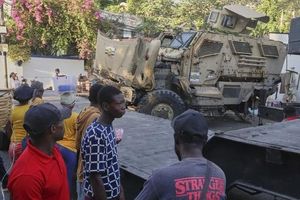Over the long Labor Day weekend in Chicago, violence returned to the headlines in a way that’s become all too familiar. According to a review of police incident reports by ABC News, at least 32 separate shootings erupted across the city between Friday evening and noon on Monday. The aftermath left residents, politicians, and national figures once again locked in a passionate debate about how to tackle Chicago’s persistent crime problem—and whether federal intervention, including the use of National Guard troops, is the answer.
The numbers are staggering. The shootings included an attack in Bronzeville late Saturday night, where seven people were struck by gunfire around 11:10 p.m. Miraculously, all are expected to survive. Not everyone was so fortunate elsewhere: a 25-year-old woman was shot multiple times on Friday and died at a local hospital, while a 29-year-old man lost his life after being targeted on Saturday night. Another man, 32, was wounded in the same incident but stabilized, according to CBS News. In total, the weekend’s violence touched every corner of the city, from teenagers struck by stray bullets in their own homes to drivers caught in crossfire on city streets.
Chicago’s mayor, Brandon Johnson, addressed the crisis at a “Workers Over Billionaires” march on Monday, closing his speech with a pointed demand: “No troops in Chicago. Invest in Chicago.” His words echoed the city’s longstanding resistance to federal boots on the ground. But the debate is far from settled—and the city’s grim statistics continue to fuel the national conversation.
In 2024, Chicago recorded 573 murders, according to ABC News. That’s a murder rate of about 22 per 100,000 people, significantly higher than New York City’s 377 murders (less than five per 100,000) and Los Angeles’ 268 murders (about seven per 100,000). Still, Chicago’s murder rate trails behind cities like Detroit (32 per 100,000), Washington, D.C. (27), and Atlanta (25). For some, that’s cold comfort.
President Donald Trump, never one to shy away from controversy, took to Truth Social on Saturday to blast Illinois Governor JB Pritzker’s handling of crime. He called Pritzker “weak and pathetic” for dismissing the need for National Guard troops in Chicago and warned, “we’re coming,” suggesting that some sort of federal action could be imminent if the city didn’t “straighten it out, FAST.”
Pritzker, for his part, has drawn a clear line. “National Guard troops or any kind of troops on the streets of an American city don’t belong unless there is an insurrection, unless there is truly an emergency – and there is not,” he stated at an August 25 press conference, as reported by AFP via Getty Images. He went further, vowing to sue the Trump administration if federal troops are deployed: “It’s an invasion with US troops, if they in fact do that. They’ll be in court pretty quickly.”
Yet Pritzker isn’t opposed to all federal help. “We would like [Bureau of Alcohol, Tobacco, Firearms and Explosives] agents to take more guns off the streets, we would like FBI to coordinate with our local law enforcement to help catch perpetrators of crimes,” the governor said. “If they would do that, we would welcome that. But that’s not what they’re planning to do.”
The president’s threat isn’t without precedent. In June 2025, Trump dispatched 4,000 National Guard troops and 700 Marine service members to California amid violent anti-ICE riots in Los Angeles. By July 1, nearly all of the National Guard members and Marines had been removed, according to ABC News. In Washington, D.C., where Trump declared a crime emergency, Democratic Mayor Muriel Bowser reported that violent crime fell by 45% and carjackings by an eye-popping 87% compared to the same period in 2024. These statistics have become ammunition for those arguing that federal intervention works—and should be tried in Chicago.
On August 28, the Chicago Tribune published a letter from Chano Hernandez, a Mexican American resident of the city’s West Side, echoing the call for federal help. “Bring in the National Guard. Bring in the federales,” Hernandez wrote. He described his neighborhood as plagued by dirty streets, graffiti, overgrown vegetation, theft, and violent crime, with minimal police presence. “Instead of welcoming temporary help from the federal government, our leaders kick and scream against it,” he continued. Hernandez questioned the effectiveness of local politicians’ resistance to federal assistance and called for a referendum to let citizens have a say about the city’s sanctuary status and approach to public safety.
Others, like Sandra Riordan of Ivanhoe, argued in the Tribune that while Trump is a divisive figure, his approach to crime deserves a fair chance: “We all want what Trump wants: safe city streets and minimal, manageable nonviolent crime, if any. We want criminals to be held, not released, and made to pay a price. We want the police to be able to do their jobs and judges to interpret the law with respect to victims as opposed to criminals.” Riordan acknowledged the political tug-of-war at play, noting, “If there wasn’t the threat of losing face for the state in its inability to clean up crime, it would let Trump do what has shown to work in D.C.”
But not everyone is convinced that troops are the answer. Governor Pritzker and Mayor Johnson have both emphasized investment in communities and collaboration with federal law enforcement agencies—short of deploying armed soldiers on city streets. Johnson, in particular, has framed the debate as a choice between militarization and investment, arguing that the city’s future depends on addressing root causes of crime: poverty, lack of opportunity, and underfunded public services.
The public’s frustration is palpable, and not just about violent crime. In another letter to the editor, Michael J. Buoscio of Lake Bluff lamented the federal government’s lack of action on gun violence, including 44 school shootings in 2025 so far. He criticized Secretary of Health and Human Services Robert F. Kennedy Jr. for focusing on vaccine controversies instead of gun safety, writing, “If Kennedy really cared about ‘Building a Healthier, Stronger America,’ this would include a real focus and definitive actions related to gun violence and school shootings.”
Meanwhile, the debate over federal funding for cities like Chicago simmers in the background. President Trump has threatened to withhold money from states and cities that have no-cash-bail policies, such as Illinois. In response, Susan D’Alessandro of Chicago suggested that Illinois should consider withholding its own contributions to the federal government until funding for essential programs is restored, noting, “We must fight fire with fire to survive as a state and provide for our citizens.”
Chicago’s crisis is not unfolding in a vacuum. The city’s struggle with gun violence, its tense relationship with the federal government, and the political battles over how to restore safety are being watched closely across the country. For now, the standoff continues: city leaders resist the idea of troops on their streets, while some residents and national figures clamor for stronger action. The question remains—where is the line between protecting civil liberties and ensuring public safety, and who gets to draw it?
As summer draws to a close, Chicago stands at a crossroads, its future shaped by choices made in city halls, statehouses, and the White House. The urgency is real, the stakes are high, and the city’s residents are demanding answers—and results.




